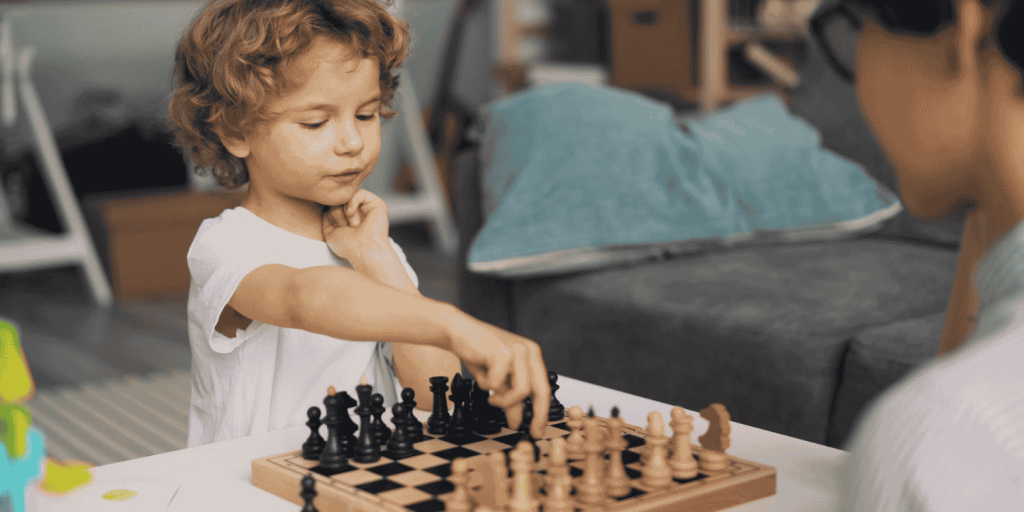How it feels being a parent
Parenting in today’s fast-paced world can feel overwhelming.
You’re trying to balance schoolwork, sports, screen time, and social life all while wondering if your child is getting the mental stimulation they truly need.
Many parents notice common challenges:
- Kids getting distracted easily
- Struggling with focus or patience
- Spending too much time on screens
- Lacking problem-solving skills or confidence
Mental sports are a powerful solution. These are activities that challenge the brain just like physical sports challenge the body. They build focus, memory, decision-making, and resilience skills that directly impact school performance and future success.
Let’s explore the top five mental sports activities for American kids, starting with the one that has changed thousands of young lives around the world: chess.
1. Chess – The Gold Standard of Mental Sports

Chess is more than just a board game it’s a mental workout that strengthens nearly every part of a child’s cognitive development.
At Kingdom of Chess, we have worked with children as young as 4 and have seen remarkable transformations. Within just a few months of online chess training, parents report that their kids:
- Sit longer with better concentration
- Become more confident in making decisions
- Handle wins and losses more maturely
- Show improved academic performance
Why Chess Works for Kids
- Focus & Patience: Each move requires attention and calm thinking. Over time, kids develop longer attention spans.
- Logical Thinking: Chess is all about patterns and strategy. Kids learn to think ahead and anticipate consequences.
- Problem-Solving: Whether it’s finding the best move or defending against an attack, children learn how to approach challenges step by step.
- Emotional Growth: Losing a game is tough, but it teaches children how to bounce back, try again, and not give up.
Getting Started
Parents often worry that chess might be “too difficult” or “too serious” for young kids. In reality, the game can be introduced gradually through stories, puzzles, and interactive lessons.
Our online chess coaching for kids is designed to be playful, visual, and engaging perfect for children between 4 and 15 years old. Lessons are led by FIDE-rated coaches who understand how to keep kids motivated while teaching them world-class skills.
Take the first step today: Join Online Chess Classes with Kingdom of Chess and watch your child grow sharper and more confident every week.
2. Sudoku and Logic Puzzles – Quiet Power for the Brain
Sudoku, crosswords, and logic puzzles may look simple, but they train a child’s brain to see patterns and think in a structured way.
Benefits
- Enhances Pattern Recognition: Kids learn to notice relationships between numbers and symbols.
- Strengthens Working Memory: They must remember rules and possibilities while solving.
- Builds Perseverance: Sticking with a puzzle until it’s solved teaches patience and grit.
Creative Ideas for Parents
- Start with picture-based puzzles for younger children (animals, shapes, colors).
- Make it competitive: Give your child a small prize if they beat their previous time.
- Create a puzzle corner at home where they can quietly focus for 10–15 minutes daily.
3. Memory Games and Brain Training – Unlocking Recall Power
Strong memory is the foundation of academic success. Kids with better memory find it easier to learn spelling, math facts, and new languages.
How to Build Memory Skills
- Matching Games: Start with simple card-matching games for preschoolers.
- Story Recall: Tell your child a short story and ask them to repeat it back.
- Memory Palace Technique: Teach older kids to visualize objects in different rooms of a house — a fun and powerful memory-building tool.
Memory games can also help shy children open up. When they recall and explain what they’ve learned, their communication skills improve too.
4. Strategy Board Games – Planning and Thinking Ahead
Board games are an underrated tool for child development. Games like Checkers, Connect Four, Sequence, or even Settlers of Catan encourage planning and strategic decision-making.
Benefits for Children
- Critical Thinking: They learn to think several steps ahead.
- Social Skills: Board games teach kids to wait their turn, cooperate, and manage both victory and defeat gracefully.
- Family Bonding: Weekly game nights create quality time away from screens.
Parents can rotate different games weekly to keep things fresh and challenging.
5. Mindful Gaming and eSports – Modern Mental Workouts
Video games often get a bad reputation, but mindful gaming can be beneficial if chosen carefully.
Choosing the Right Games
- Strategy games that involve planning and teamwork are better than mindless action games.
- Puzzle-based video games help with problem-solving and critical thinking.
- Racing and sports games can improve reaction time and coordination.
Setting Healthy Limits
- Limit gaming time to 45–60 minutes a day.
- Encourage kids to play in common areas, not in isolation.
- Pair gaming with physical activity (play outside after gaming session).
Final Thoughts for Parents
Mental sports are not just activities to “pass time.” They are powerful tools for raising focused, confident, and emotionally strong children.
If you’re unsure where to begin, start with chess. It combines strategy, discipline, and creativity and it’s screen-free, making it the perfect first step toward developing your child’s brain.



